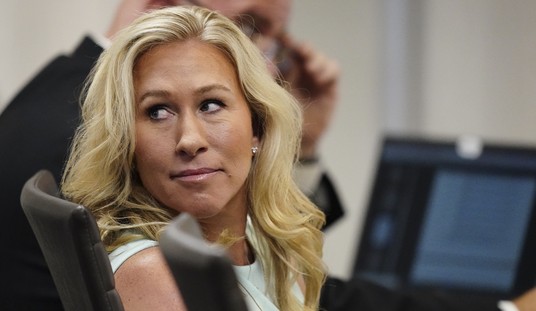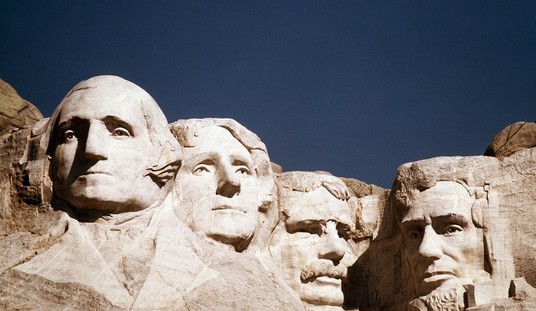A done deal, and given Connecticut’s deep blue electorate, one not likely to be overridden by amendment.
Probably good for McCain, though.
The Supreme Court released its historic ruling at 11:30 a.m. Citing the equal protection clause of the state constitution, the justices ruled that civil unions were discriminatory and that the state’s “understanding of marriage must yield to a more contemporary appreciation of the rights entitled to constitutional protection.”…
In a statement released minutes after the decision was announced, Gov. M. Jodi Rell said she disagreed with it, but uphold it. She said she was proud to sign the state’s civil unions law in 2005, the first in the nation enacted without a court mandate, and thought it was “equitable and just.”
“The Supreme Court has spoken,” Rell said. “I do not believe their voice reflects the majority of the people of Connecticut. However, I am also firmly convinced that attempts to reverse this decision — either legislatively or by amending the state Constitution — will not meet with success. I will therefore abide by the ruling.”…
The opposition will now turn its sights to the November election, when voters will be asked whether the state should convene a constitutional convention. “Connecticut voters will have one opportunity on Nov. 4 to reassert their right to self government. We must vote yes.”
Here’s the opinion. Skip ahead to page 21 for the crux of it, declaring gays a “quasi-suspect class” for purposes of the state’s equal protection jurisprudence. What “class” you are pretty much determines as a rule whether you can be discriminated against by law; if you belong to a class that’s “suspect,” i.e. historically powerless and persecuted, then the legislature has virtually no leeway against you. The Connecticut Supremes decided they couldn’t call gays a fully “suspect” class because the U.S. Supreme Court hasn’t declared them that (yet), so they opted for “quasi-suspect” based on four factors: (1) historic discrimination, (2) whether sexual orientation is related to one’s ability to contribute to society (this is here to give the state extra power to regulate the disabled), (3) immutability of sexual orientation, i.e. is it a choice or is it inborn and thus unchangeable, and (4) whether gays lack political power, which starts on page 28 and is the most interesting section of the four.
All in all, the analysis is similar to the California Supreme Court’s, which also used an equal protection argument to strike down their state’s marriage statute. The fatal blow for gay marriage opponents is the fact that the state already allows civil unions for gay couples; I think laypeople look at that and assume that that means the state, having acted in good faith, will be given the benefit of the doubt when gays inevitably sue for full marriage rights, but as I’ve tried to explain before, it doesn’t work that way. To discriminate by law, you need a good reason. Admitting that gays should be entitled to all the same rights as married couples but not the label of “marriage” itself forces the court to conclude that the distinction is purely semantic, and semantics simply ain’t good enough as a “good reason.” From page 62:
Although we acknowledge that many legislators and many of their constituents hold strong personal convictions with respect to preserving the traditional concept of marriage as a heterosexual institution, such beliefs, no matter how deeply held, do not constitute the exceedingly persuasive justification required to sustain a statute that discriminates on the basis of a quasi-suspect classification. ‘‘That civil marriage has traditionally excluded same-sex couples—i.e., that the ‘historic
and cultural understanding of marriage’ has been between a man and a woman—cannot in itself provide a [sufficient] basis for the challenged exclusion. To say that the discrimination is ‘traditional’ is to say only that the discrimination has existed for a long time. A classification, however, cannot be maintained merely ‘for its own sake’ [Romer v. Evans, supra, 517 U.S. 635]. Instead, the classification ([that is], the exclusion of gay [persons] from civil marriage) must advance a state interest that is separate from the classification itself [see id., 633, 635]. Because the ‘tradition’ of excluding gay [persons] from civil marriage is no different from the classification itself, the exclusion cannot be justified on the basis of ‘history.’ Indeed, the justification of ‘tradition’ does not explain the classification; it merely repeats it. Simply put, a history or tradition of discrimination—no matter how entrenched—does not make the discrimination constitutional . . . .’’ (Citation omitted.) Hernandez v. Robles, supra, 7 N.Y.3d 395 (Kaye, C. J., dissenting)…It is only because the state has not advanced a sufficiently persuasive justification for denying same sex couples the right to marry that the traditional definition of marriage necessarily must be expanded to include such couples. If the defendants were able to demonstrate sufficient cause to deny same sex couples the right to marry, then we would reject the plaintiffs’ claim and honor the state’s desire to preserve the institution of marriage as a union between a man and a woman. In the absence of such a showing, however, we cannot refuse to follow settled equal protection jurisprudence merely because doing so will result in a change in the definition of marriage.
Exit question: Time to start talking about Obama’s judicial appointments?







Join the conversation as a VIP Member